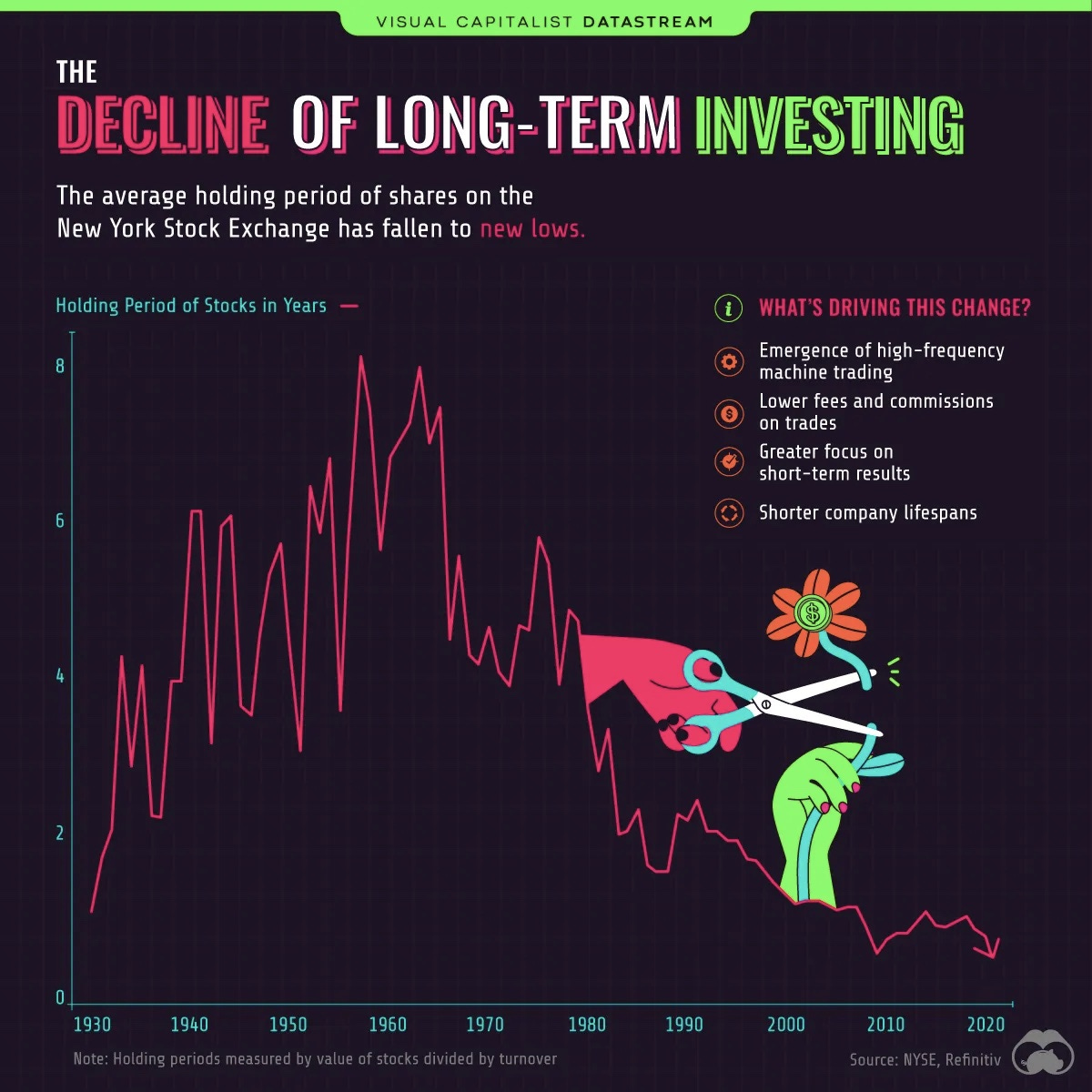Part 2 of 2 in our series “Techniques Any Investor Can Use to Outsmart the Pros”
Let’s talk about patience. When you invest in the stock market, taking a long-term time horizon can give you a significant competitive advantage, and that’s what this second installment of Techniques Any Investor Can Use to Outsmart the Pros is all about.
In today’s world of short-term investing, where stock trading is increasingly computer-driven and stocks’ average holding period is just 5.5 months (down from 8 years in the late 1950s), how can investors gain an edge against the machines? You might be surprised to learn that individuals can enjoy a significant advantage: the ability to be patient and invest for the long term. Most quantitatively driven investors tend to avoid this approach, and when you have less competition, your chance of success can be significantly higher.

“A stock is not just a ticker symbol or an electronic blip; it is an ownership interest in an actual business, with an underlying value that does not depend on its share price.”
– Benjamin Graham, The Intelligent Investor
If you start treating stock purchases as a way to gain an actual ownership interest in a business (instead of a way to chase a quick buck) and purchase only stocks that you intend to hold for the long term while ignoring day-to-day stock price fluctuations (hard as that may be), you can tip the odds of investment success in your favor. As a bonus, if your accounts are taxable, then you’ll enjoy the added benefit of paying much less to Uncle Sam. (We’ll talk more about the importance of tax-efficient investing in a future article.)
Being a value investor frequently means taking a contrarian position. Going against the “wisdom” of the crowd is often lonely and can be psychologically difficult (especially when the popular stocks are performing well and your stocks are stagnating or decreasing in value). Value investors are often early to the party, but if you conduct proper research into a company and conclude that it is:
selling at a significant discount to its intrinsic value,
enjoys competitive advantages,
has a catalyst for capital appreciation,
then with patience, value investing can bring great rewards. But don’t expect instant gratification.
Patience in practice
Meanwhile, many investment professionals are hamstrung by clients who will fire them if they underperform in the short term. This offers a significant competitive advantage to nonprofessional investors: the only “client” you need to answer to is yourself.
From Jonathan Boyar:
The benefits of being patient—and of having the right clients—were brought home to me shortly after the global financial crisis when I visited the office of a successful hedge fund manager and client who wanted to know some of our highest-conviction stock ideas.
“Right now,” I told him, “one of our favorite ideas is Home Depot.” I ran him through our investment case for the Company, explaining that poor industry fundamentals were masking the operational progress made under CEO Frank Blake. What’s more, I told him, investors would enjoy a margin of safety based on our estimate that the company’s owned real estate accounted for a significant percentage of its current market capitalization.
Intrigued, the manager asked, “What are the catalysts?”
An eventual housing recovery, I explained, would prompt the building of new houses while also encouraging homeowners to embark on major home improvement projects. Either, let alone both, should significantly boost sales and margins.
His next question? “So what’s the time frame?”
Providing an exact time frame for our thesis was impossible, I told him, but during the meantime he’d be owning great assets at a significant discount to their intrinsic value. Value gets recognized: it’s just a question of when.
In the end, the manager decided to pass on the idea. “If I underperform for a year or two, my investors will disappear,” he said. “This is a perfect investment to buy—for my kids.” But as things turned out, from September, 2011 when we issued a 92-page comprehensive report discussing
how to profit from a housing recovery through August 2023 Home Depot increased its value by over 1,225% (including dividends reinvested), versus 380% for the S&P 500.Maybe I just got lucky in pointing him toward such a perfect example of value investing. Maybe. But I knew how inexpensive Home Depot was, I knew that it was a high-quality business, and I believed that over time, the stock market would value Home Depot much more favorably than it was right then.
Patience and persistence pay off. When you find yourself going against the crowd, remember that stocks are often undervalued because most investors don’t have the patience to wait for a well-reasoned thesis to play out—their time horizon is simply too short. But if you’ve diligently researched a company and believe in your thesis, then perhaps it’s time to trust your own judgment and ignore the opinions of those who endlessly flit from stock to stock, searching for instant gratification.
Important Disclosures. The information herein is provided by Boyar’s Intrinsic Value Research LLC (“Boyar Research”) and: (a) is for general, informational purposes only; (b) is not tailored to the specific investment needs of any specific person or entity; and (c) should not be construed as investment advice. Boyar Research does not offer investment advisory services and is not an investment adviser registered with the U.S. Securities and Exchange Commission (“SEC”) or any other regulatory body. Any opinions expressed herein represent current opinions of Boyar Research only, and no representation is made with respect to the accuracy, completeness or timeliness of the information herein. Boyar Research assumes no obligation to update or revise such information. In addition, certain information herein has been provided by and/or is based on third party sources, and, although Boyar Research believes this information to be reliable, Boyar Research has not independently verified such information and is not responsible for third-party errors. You should not assume that any investment discussed herein will be profitable or that any investment decisions in the future will be profitable. Investing in securities involves risk, including the possible loss of principal. Important Information: Past performance does not guarantee future results. The company mentioned in this sample are for informational purposes only and the performance of the stock selected is not indicative of the performance of the stocks profiled in Boyar Research, the performance of the stocks selected, and the performance of Boyar Research may in fact diverge materially. Additional information regarding the performance of other companies in Boyar Research is available upon request.
This information is not a recommendation, or an offer to sell, or a solicitation of any offer to buy, an interest in any security, including an interest in any investment vehicle managed or advised by affiliates of Boyar Research. Any information that may be considered advice concerning a federal tax issue is not intended to be used, and cannot be used, for the purposes of (i) avoiding penalties imposed under the United States Internal Revenue Code or (ii) promoting, marketing or recommending to another party any transaction or matter discussed herein. Clients of an affiliate of Boyar Research and employees of Boyar Research own shares in Home Depot.







